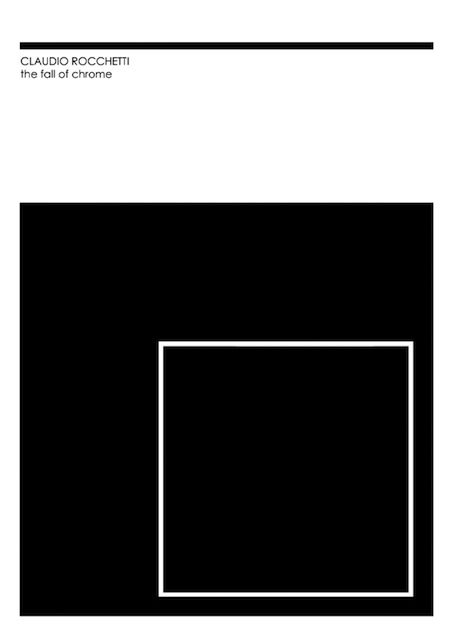Follow Lang Leve Lou Ottens! on Tumblr!
De Val van Chroom / The Fall of Chrome
december 29, 2013.
'the reverse side of the tape
is the slow speed of our memory'
( * )
The Fall of Chrome is the title of a booklet, edited by Claudio Rocchetti, with a collection of images and texts about magnetic tape. Among them you will find the original version of Higgs singlet decay particles pop into my universe at random times, the story of my friend Penelope's 20 years of auto-audio-surveillance onto compact cassettes. (Here is a link to a uTube clip of my reading of this text, made on the occasion on this year's first 2013 = C50 event, on March 17th.)
The Fall of Chrome was published in February of this - the cassette's 50th anniversary - year in a limited edition of 300 copies, each of which is accompanied by a (unique) cassette.
You can order your copy at musica-moderna.org.
The first time that I met Claudio, other than through the exchange of short messages via email, was at the end of this summer in Berlin, where he was one of the artists contributing to the Tenth Tales for Tapes, organized and curated by Rinus van Alebeek, on August 30th 2013 at Urban Spree, on the Revaler Straße.
August 30th 2013 was a Friday, like the August 30th in 1963 when, precisely half a century earlier and in the same city, Philips presented its compact cassette to the world ...
Seit diesem Tag war auch die Compakt Cassette der Fall ("Die Welt ist alles was der Fall ist"). ☜ Lou Ottens's invention turned magnetic tape, quite literally, into a case. ☞ And everything that is the case, eventually will fall: the world is everything that falls, eventually. ( ** )
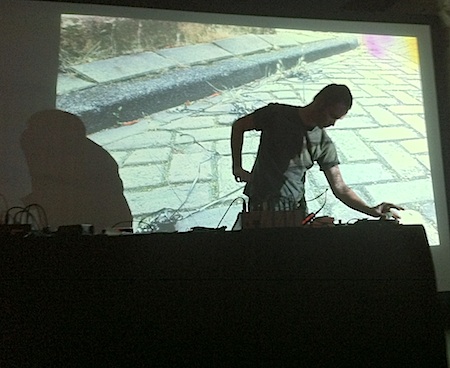
Claudio's thoughtfully constructed set was one of the highlights of this well organized and nicely located, though sadly too poorly attended, event.
His was a groping thoughtfulness, that reminded me of the one reflected in the collection of images and texts that Claudio brought together in The Fall of Chrome. Strangely, it was only after the collection's publication, that I learned about his motivation for asking a - apparently pretty much random - group of people to contribute a couple of pages on the subject of 'magnetic tape'.
"Most of them are musicians or label owners who somehow took part in the 'renaissance' and development of tapes in the experimental music underground," Claudio wrote in the first email that I received from him, on December 19th 2010. But the nature and content of a possible contribution was kept wide open. And vague: "Your work can be a collage, a writing, photographies, drawings..."
...
Here are Claudio's words, as they can be read in the booklet's Intro:
"After many years experimenting with tapes [...] I started to feel lost; like I had exhausted the subject and all the ideas [...] I took a break. I stopped using tapes [...]"
His attempts "to break new ground", however, seemed merely to lead him up "dead end streets", and Claudio started to ask himself whether "it really [does] matter why we use certain tools?"; and in its wake, taking a meta-step: is it worth your while to pose this and similar questions and spend ('waste') your time trying to answer them?
...
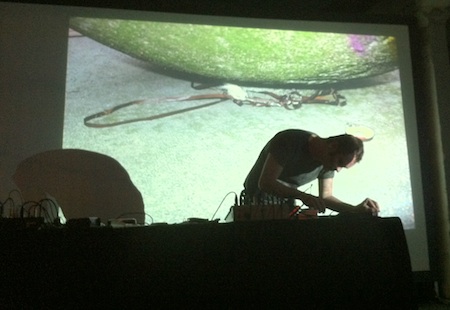
...
Despite feeling lost among all the world's tapes and being on a 'tape sabbatical', Claudio continued to collect cassette tapes. He found them in 'all imaginable places', though it appears that he picked up the bulk in and around Berlin; at flea markets, which all over the world are among our culture's richest, often disregarded and undervalued, focal points, where the material projections of memories of entire generations are concentrated, after having been discarded as un-keep-able; sometimes in the midst, but mostly at the end, of many a life's journey. Flea markets are places where a myriad of memories fall, materialized as writing (letters, journals, postcards...), as photographs, as films... And in sound.
...
Sound-writer Daniela Cascella summarizes the sonic textures that Claudio found on the tapes that he collected, in what we might call the booklet's 'title track': "He listened for hours," Daniela writes, "to piano chords on a rotating rhythm. To thick layers of muddy sonic waste. To hisses over people talking in a market place. To odd compilations. To botanic lessons. To radio programs in known and unknown languages. To homemade recordings of objects. To aerobic lessons. To the voices of people fighting. To demo tapes of folk bands. To travel notebooks. To long stretches of nothing. To absurd field recordings."
It is an enumeration - obviously incomplete and merely a list of for-example's - that evokes the sort of random sample from 'all the sounds of the world' similar to the one that I continue to unearth in the 24/7 Found Tapes Exhibition stream; a stream of sonic textures typical of recordings onto magnetic tape in varying states of decay; textures that continue to fascinate me and many others; because of their noisiness and glitchy granularity; because of their predominantly Campy and/or exotic musical/textual subject matter; and because of their randomness. Though sometimes a found cassette's case or cover may contain a trustworthy indication of the tape's content, in a majority of cases it does not: the sounds on most found tapes are sounds that befall you.
...
It made me think of the recently deceased Dutch composer Dick Raaijmakers, in whose work the notion and the mechanisms of 'falling' play a central role. "Iets dat valt komt per definitie ongericht ergens op de wereld terecht. Vallen heeft alles te maken met ongeluk," he writes in the introduction to his The Microman (1982): to fall is intimately linked to accident. ( *** )
For many, many years we could pick up any quantity of tapes (chrome) that, either complete or in bits and pieces, continued to fall at random spots around us. But now that as an 'everyday medium' compact cassettes have become obsolete - note that also this is a 'fall of chrome', like the fall of an empire - there will be less and less chrome falling.
...
Claudio decided to use the sounds stored on the cassette tapes that he found. It was a process that "resulted in a 3 hour long composition," he writes, "that I later recorded back onto the original tapes; 300 cassettes in total, each with different portions of the composition interacting with the source material.".
Each of the 300 copies of The Fall of Chrome comes together with one of these 300 cassettes. My copy is number 121. Deutsche Qualitäts Compact Cassette, it says on the black cover card that proudly, in shiny silver letters, announces the tape's materiality: chromdioxid.
Here is a picture of the cassette, that early April of this year made its fall into my French mailbox.
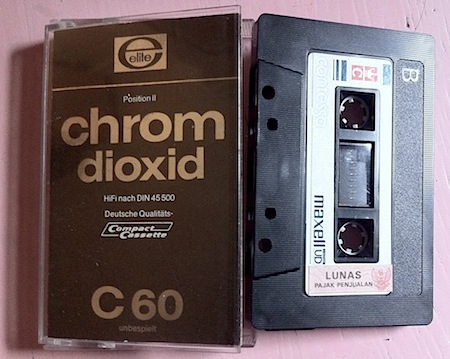
...
In Dutch the title of Claudio's anthology would have been: De Val van Chroom. To most viewers this will seem little more than a straightforward, word-by-word, rendering of the booklet's English title: The becomes De, Fall then will be Val, of translates as van, and Chrome in Dutch is Chroom.
However, unlike the English fall, the Dutch val not only means the act of falling, collapsing, loss or descent. It may equally well refer to 'that into which one falls': in Dutch val also means what in English would be called a trap.
It is a very useful and interesting way of viewing cassettes.
For obviously we use cassettes to catch sounds. They, quite literally, are being 'trapped in chrome'.
It also sheds another light on the - let us call it - tape fatigue that led Claudio to embark upon the collection of documents that became The Fall of Chrome. Maybe Claudio was overwhelmed, not so much by a sense of being lost, as by a sense of being trapped by tapes.
The small gem of a booklet that he edited shows, without the shadow of a doubt, that in this he does not stand alone.
...
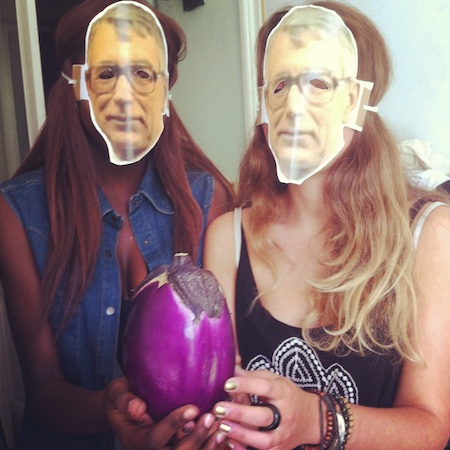
...
[ At both of this year's Tales for Tapes events, Rinus van Alebeek and myself celebrated the cassette's 50th anniversary with a performance of our ad hoc impromptu tape tinkering dictaphone duo: Hollands Spoor. Two +/- ten minute extracts of recordings made of our Werkzaamheden (the first one at Ivry s/ Seine, the second in Berlin) are available as a digital EP at Bandcamp, embedded below. Lang Leve Lou Ottens! Hear our tapes falling... ]
...
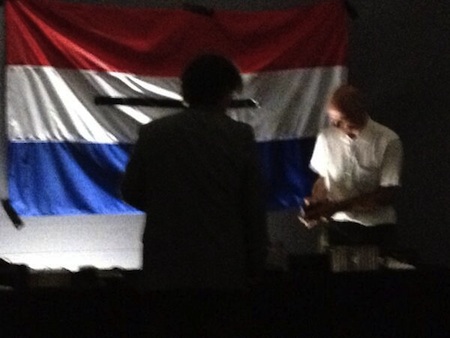
notes __ ::
(*) Francesco Cavalieri, in The Fall of Chrome. [
^ ]
(**) Cf. Ludwig Wittgenstein - Tractatus Logico-Philosophicus [
^ ]
(***) Cf. Dick Raaijmakers - De val van Benito Mussolini. In: Raster 29 (1983) [
^ ]
tags: cassette, 2013=C50, Lou Ottens
# .446.
comments for De Val van Chroom / The Fall of Chrome ::
|
Comments are disabled |
